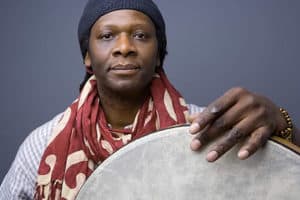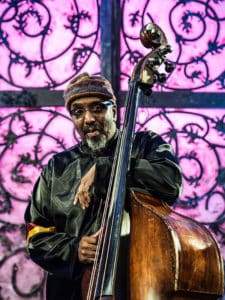Sunday, June 19 — PUTNEY —Next Stage Arts presents avant-garde jazz legends William Parker and Hamid Drake, in a concert setting the poetry of David Budbill to music. The concert is at 5 p.m .on Sunday, June 19, at Next Stage Arts, 15 Kimball Hill in Putney.
“Vermont’s artistic treasures know no bounds. David Budbill was an enigmatic artist and poet who had strong connections to the national and international arts stage,” says Keith Marks, Executive Director of Next Stage Arts. “His long history with jazz legends William Parker and Hamid Drake speak volumes as to the power and presence of the man. We are excited to host Parker and Drake in celebration of Budbill’s life and work.”

Hamid Drake
The words of celebrated Vermont poet David Budbill take center stage in this one-of-a-kind concert. David’s long-time collaborator and avant-garde jazz legend William Parker (composer / double bass / multi-instrumentalist) leads a group of multi-genre musicians in an incantation of poetry and improvised music. We are excited to present William Parker along with famed percussionist Hamid Drake, and vocalists Lisa Sokolov, Kyoko Kitamura, Morley Shanti Kamen, Andrea Wolper, and Amirtha Kidambi on their way back to New York from concerts produced by Scrag Mountain Music in Montpelier and Burlington.
This program honors and highlights the rich, vibrant, and quintessentially Vermont words of the late poet David Budbill, posthumously named The People’s Poet of Vermont by the citizens of Montpelier and honored by the Vermont State House. David Budbill was born in Cleveland in 1940 and moved to Northern Vermont in 1969 where he lived for 47 years until his death in 2016. During his prolific career, David authored eight books of poems, seven plays, two novels, a collection of short stories, two picture books for children, dozens of essays, and the libretto for the opera A Fleeting Animal (composed by Erik Nielsen and performed in 2015 with Mary Bonhag in a lead role). Budbill’s love of music and performing took him from schools and prisons in Vermont to avant-garde performance spaces in New York City where he appeared often with William Parker and other collaborators.
Sutras for a Suffering World features the world premiere of two new works, one titled While We’ve Still Got Feet: The Poetry of David Budbill and the other titled Need, Necessity, Delight, or A Washing Machine for a Flower Pot, both by New York City-based free jazz double bassist, composer, improvisor, writer, and educator William Parker (“the most consistently brilliant free jazz bassist of all time.” — The Village Voice) whose prolific career includes over 150 albums, six books, and the mentoring of hundreds of young musicians and artists.

William Parker
Chicago-based percussionist Hamid Drake has collaborated extensively throughout his career with top free jazz improvisers Peter Brotzmann, Fred Anderson, and Ken Vandermark, among others. Drake has also worked with trumpeter Don Cherry, Pharoah Sanders, Fred Anderson, Mahmoud Gania, bassist William Parker (in a large number of lineups), and has performed a solstice celebration with fellow Chicago percussionist Michael Zerang semiannually since 1991.
From Budbill’s daughter, Nadine Budbill
Seven years ago I wrote the liner notes for a CD that combined William Parker’s music and my father’s poetry. This CD was one of many, many collaborative projects and performances the two did together over their decades-long friendship.
I wrote: Two men. Two very different worlds. One black, from the high-rise projects of the South Bronx. One white, from the coal-grit covered streets of Cleveland. One inhabits the concrete jungle of New York City. The other, rooted in the rural hills of Northern Vermont. One is a musician. The other, a poet. How is it that these two men, from such different places and experiences, became steadfast friends and collaborators?
William Parker and David Budbill met over 30 years ago when David, having read an article about William in Coda Magazine, wrote a fan letter to him and sent it to his hotel room in Paris, where he was playing with Cecil Taylor. Much to David’s satisfaction, William wrote back and sent along an album of his own music. Then commenced a long exchange of books and albums, until the two finally met in person when William played a gig in Burlington, Vermont, not far from David’s home. Not long after that, they played their first gig together in New York City. The rest, as they say, is history. Countless gigs, albums, projects, and visits (both in the city and the country) later, William and David continue to be collaborators and friends.
The synergy of David Budbill and William Parker is remarkable, despite their very different lives. Ultimately there is something so similar about these two men and their work. They are unflinching and devoted––as artists, citizens of their communities and our world, and as partners and fathers. Both channel their creativity from a deeper place––they are receivers––and have an uncanny ability to open up and receive that which flows forth as poetry and improvisation and sound and pure love for life. Both live their lives in absolute commitment to their calling. And, perhaps most importantly, both see their work, not as artistic or intellectual abstraction, but as salve for a suffering world. With great creative courage, both of these men tell it like it is and play by no one else’s rules.




